Wuhan Lab Allowed to Destroy ‘Secret Files’
Rumble = https://rumble.com/user/SweetHomeStAugustine
Locals = https://sweethomesa.locals.com/
POPULIST REVOLT = https://populistrevolt.com
The Wuhan Institute of Virology (WIV) has the right to make a partnering U.S. lab wipe all data arising from their collaborative work, a legal document reveals.
A memorandum of understanding (MOU) of cooperation, signed between the Wuhan lab and the Galveston National Laboratory at the University of Texas Medical Branch, makes it obligatory for each of the two labs to delete “secret files” or materials upon the request of the other party.
“The party is entitled to ask the other to destroy and/or return the secret files, materials, and equipment without any backups,” states the MOU obtained by U.S. Right to Know, a nonprofit investigative research group focused on public health, through a freedom of information request.
The MOU focused on promoting research and training cooperation between the two labs. It was signed in 2017 and stays in effect through this October. But the confidentiality terms would remain binding even after the agreement’s five-year-duration expires, the agreement states.
The document goes on to broadly define what materials are to be treated as “confidential,” opening the door to potentially all documents and data from any collaboration being subject to a deletion request.
“All cooperation and exchange documents, details and materials shall be treated as confidential info by the parties,” the MOU states.
The WIV has been at the center of the controversy due to growing speculation that the virus that causes COVID-19, which has now killed millions around the globe, may have leaked from the facility. The lab has denied these allegations but Beijing has blocked international investigators to data and records from the facility thus preventing any meaningful probe into the hypothesis.
WIV and the the Galveston National Laboratory formally declared their partnership the following year to “streamline future scientific and operational collaborations on dangerous pathogens,” according to a joint announcement in the journal Science.
Experts said the MOU terms about data removal raise alarm bells and can potentially constitute a breach of the law.
“The clause is quite frankly explosive,” Reuben Guttman, a partner at Guttman, Buschner & Brooks PLLC who focuses on ensuring the integrity of government programs, told Right to Know. “Anytime I see a public entity, I would be very concerned about destroying records.”
“You can’t just willy nilly say, ‘well, you know, the Chinese can tell us when to destroy a document.’ It doesn’t work like that,” he added. “There has to be a whole protocol.”
Christopher Smith, a spokesperson for University of Texas Medical Branch (UTMB), told the Right to Know that the lab was “built by the National Institutes of Health to help combat global health threats.”
“As a government-funded entity, UTMB is required to comply with applicable public information law obligations, including the preservation of all documentation of its research and findings.”
The Galveston National Laboratory is one of two federally-funded university-based highest-level biosecurity labs in the United States. It began collaborating with the WIV in 2013, a cooperation that entails training WIV scientists and conducting joint research programs. The then-Galveston lab director James Le Duc, who retired last year, made multiple trips over the years to WIV.
The Galveston lab was also among the first in the world to receive samples of SARS-CoV-2 (the virus that causes COVID-19) from the U.S. Centers for Disease Control and Prevention, nearly three weeks after Le Duc urged his Chinese counterparts to share the material.
The revelations contained in the 2017 MOU appear to contradict claims from WIV scientists that they would never scrub critical research information.
Chinese virologist Shi Zhengli, who heads the Center for Emerging Infectious Diseases at the WIV, had characterized allegations that her lab would delete such data as “baseless and appalling.”
“Even if we gave them all the records, they would still say we have hidden something or we have destroyed the evidence,” she said.
In September 2019, months before several of its researchers allegedly fell ill with COVID-like symptoms, the facility took its main database of virus samples offline.
The Wuhan lab’s safety standards have also attracted scrutiny since the pandemic broke out from the city. Footage from 2017 showed that some researchers from the facility were feeding a bat while wearing only surgical gloves, and at least one researcher wore only a pair of regular glasses and a surgical mask when out collecting bat samples.
Continues on-line
-
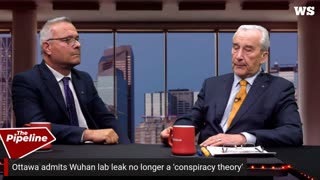 7:47
7:47
Western Standard
10 months agoWuhan lab leak
4431 -
 15:09
15:09
Mark Levin Show
1 year agoThe Wuhan Lab Leak
10.8K18 -
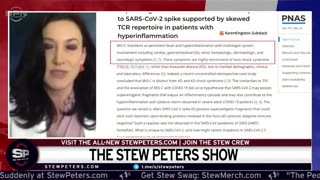 7:07
7:07
Larsring00
1 year agoWuhan “lab leak” - LIE.
23 -
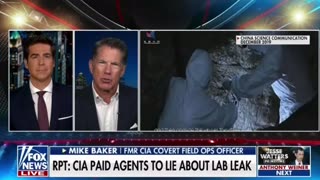 5:56
5:56
Deep State Crime Scene
8 months agoBREAKING! CIA paid off investigators to shut up about Wuhan Lab Leak!
279 -
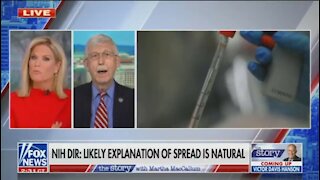 2:11
2:11
Mr Producer Media
2 years agoNIH Director: A Wuhan Lab Leak Is An Extraordinary Claim
1913 -
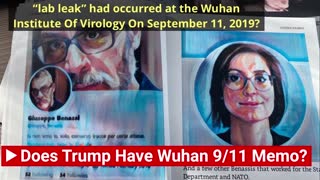 2:19
2:19
georgewebb
1 year agoWuhan Lab Leak Memo - A 9/11 Smoking Gun In Wuhan?
531 -
 29:02
29:02
Not MSM
8 months agoCredible whistleblower claims CIA paid off scientists to refute the Wuhan lab leak
25 -
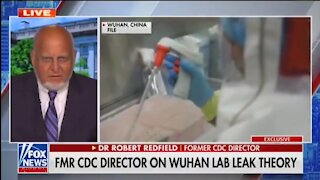 1:04
1:04
Mr Producer Media
2 years agoFormer CDC Director: I Was Threatened For Taking Wuhan Lab Leak Theory Seriously
5.15K -
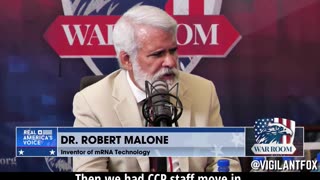 0:56
0:56
Vigilant News Network
10 months agoRevelations Indicate the Intelligence Community Knew About the Wuhan Lab Leak in 2019
1.25K2 -
 0:56
0:56
RaisingAwareness
10 months agoRevelations Indicate the Intelligence Community Knew About the Wuhan Lab Leak in 2019
114